.NET is a popular software development framework for desktop and web application development. Its popularity stems from the fact that it's open source, free, and easy to use for many different application types.
Advantages and Disadvantages of .NET Development
The tech world is constantly evolving, but . NET has been Microsoft's primary developer platform since 2000, and it continues to thrive.
Fernando Ayrosa Vezzali, Softjourn's Senior .NET developer describes this framework as "the best of both worlds," as it's supported by Microsoft and, simultaneously, operates as an open-source platform. However, is .NET the right framework for your next project?
We will examine some of the fundamental aspects of .NET and discuss the significant advantages and disadvantages it offers.
As a developer or a business owner, it is crucial to understand the benefits and challenges of working with .NET to make informed decisions about its implementation. So, let's explore the world of .NET together.
The Basics of .NET Framework
.NET, sometimes called dotnet software, is a popular software development framework for desktop and web application development. Its popularity stems from the fact that it's open source, free, and easy to use for many different application types.
With 11 programming languages supported natively by .NET - including C#, F#, and Visual Basic - and cross-platform implementations like .NET Core, .NET Framework, and Xamarin, .NET is a versatile tool for any .net projects.
The History of .NET
In the 90s, Microsoft was working on several different technologies, and one of them was the idea of a development platform that would improve the code development experience. In 2002, .NET framework was released and at the time, it was only focused on Windows-based computers and products.
C#
The first release of the .NET framework was in 2002 when C# appeared. It was focused on Windows-based devices and servers. In 2014, Microsoft announced a significant shift by presenting .NET Core, a cross-platform and cloud-friendly open-source framework version.
-Fernando Ayrosa Vezzali, Senior .Net Developer
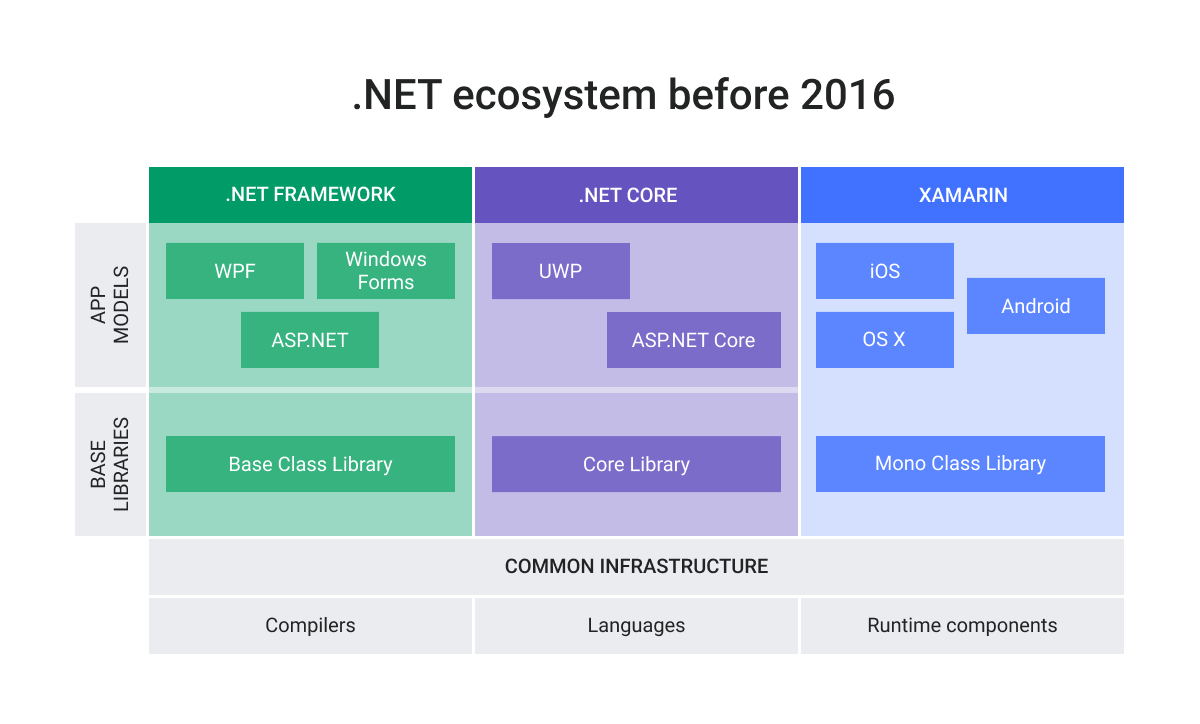
Xamarin
In 2016, there was a new addition to the .NET platform family as Microsoft acquired Xamarin, a cross–platform tool for mobile development, and made it open source as well. Microsoft was slowly moving towards creating more transparency between the frameworks with the idea to unite them in an ecosystem.
.NET 5
All .NET elements were finally bundled together in 2019 when the company announced the idea behind .NET 5 development platform. This .NET platform comes with new language features, APIs, and improved runtime. It also offers ASP.NET Core, WPF, Entity Framework Core, WinForms, and ML.NET.
.NET 6
.NET 6 was delivered in 2021 and 2022, and it offered a unified .NET application development system for building various applications and projects on the cloud, browser, IoT, mobile, and desktop environments.
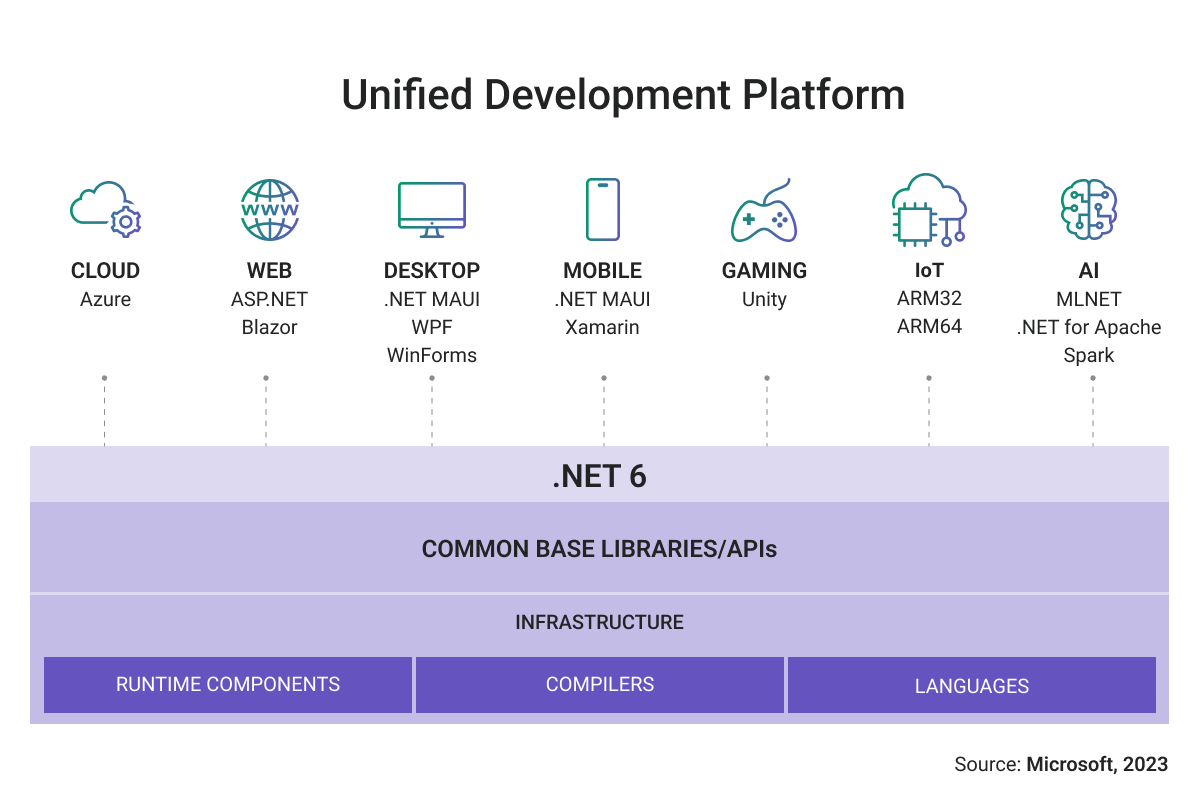
.NET 7
.NET 7, Microsoft's newest iteration of the .NET Framework, empowers developers to craft Windows OS applications. It brings upgrades to #CLR (Common Language Runtime), introduces the Roslyn compiler, and enhances #ASP.NET, #WCF (Windows Communication Foundation), and #WPF (Windows Presentation Foundation). .NET7 unveils the innovative Windows Runtime, facilitating cross-platform application development for use on diverse devices.
.NET 8
.NET 8, set for release in November as a long-term support (LTS) version, brings several key enhancements. Notable features include the ability to dynamically adjust memory limits using the .NET garbage collector, making it ideal for cloud-native applications.
Improved JSON handling supports new numeric types, such as the half struct, beneficial for machine learning tasks. New .NET methods for randomness and cryptographic tools offer flexibility and security. However, be cautious of breaking changes, and monitor Windows Forms, which has undergone pixel scaling adjustments to ensure compatibility with high-DPI screens.
Some features are tied to specific hardware advancements, such as vector acceleration features, impacting Intel AVX-512-supported platforms. Additionally, updates have trimmed container images, optimizing space and security in Kubernetes deployments.
Machine Learning in .NET
Microsoft has introduced ML.NET, a fresh framework that seamlessly integrates machine learning capabilities into .NET applications. This open-source tool is freely available, empowering developers to tailor it to their specific business requirements.
ML.NET can be effortlessly incorporated into both new and existing applications with minimal complexity. It also offers the convenience of utilizing pre-built AI models for tasks such as voice, emotion, and sentiment recognition and detection.
With ML.NET, you can enhance your .NET application's ability to learn customer behaviors, enhance user experiences, predict growth, forecast sales, and identify fraud, all while maintaining speed, security, and quality.
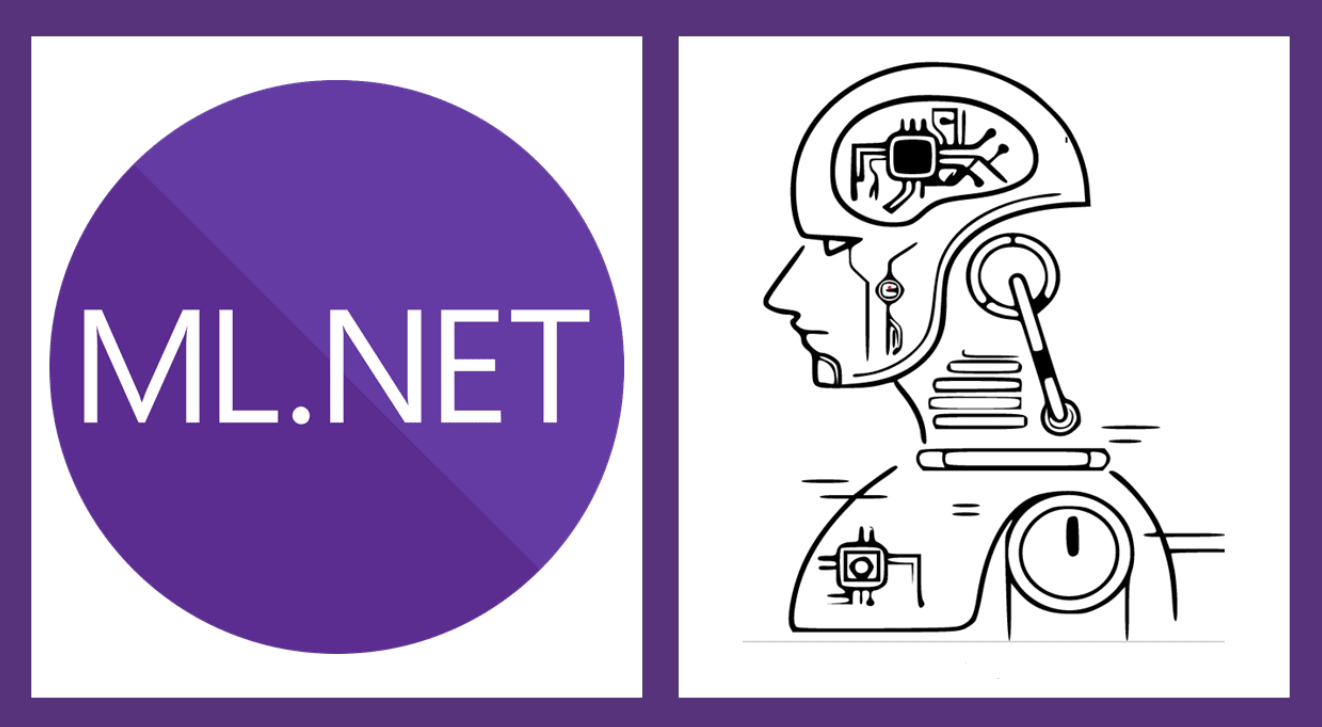
Reasons Businesses Choose to Use .NET
The .NET framework is a widely used software development platform that many businesses choose to use for their products. Softjourn's .NET developer, Gabriel Bombardi said, "In my experience, .NET has been one of the best choices to be used on client’s projects because it can provide cost-efficient applications combined with good performance."
He finds that companies like using .NET because of the amount of available developers, environment choices, and architectural patterns. Besides these, here are other compelling reasons why companies choose .NET development for their projects.
Senior .NET developer, Fernando Ayrosa Vezzali, sees our clients often choose .NET because of the "transparency it provides and continuous improvements due to it being open-source." He said it's a great option for companies because it "easily integrates with cloud providers, source control, continuous integration/continuous delivery (CI/CD), and Visual Studio."
Platform Independence
One of the most significant advantages of .NET is its platform independence. The framework can support any application on any platform, making it a reliable choice for cross-platform development.
Whether you are creating desktop, web, or mobile applications, .NET development has got you covered. Its mobile applications support various operating systems, including Android, iOS, and Windows, allowing you to reach a broader audience with your apps.
Better Performance
Another reason to choose .NET is its superior performance. .NET is known for its high-speed responsiveness, just-in-time compilation, and improved performance, which offers an unparalleled user experience.
Additionally, .NET's exceptional performance allows you to handle a massive amount of data and process it seamlessly, which is essential for data-driven applications.

Excellent User Interface and Architecture
The .NET framework is also renowned for its excellent user interface and architecture. It is an open-source platform that offers developers access to efficient and dynamic Integrated Development Environments (IDEs).
With the best-in-class Model-View-Controller (MVC) architecture, intuitive user interface, and superior UI controls, you can create compelling applications that are easy to navigate and use.
Favored by Developers
.NET is favored by developers globally and for a good reason. The framework is an open-source programming platform that offers cutting-edge technology, making it an exciting platform for developers to work on.
In the Stack Overflow Developer Survey, .NET has been named the most favored framework for four years in a row (2019, 2020, 2021, and 2022). In 2023, Stack Overflow disaggregated .NET to be more specific, and specifically .NET (5+) is top of the list again this year for other frameworks and libraries. The older .NET Frameworks (1.0 - 4.8) also ranked fourth in favored frameworks.
Gabriel Bombardi, one of our software developers, said he favors .NET, especially with C# 12 because it "excels in building high-performance distributed systems with complexity." He added, "Its versatility supports both Linux and Windows, enabling cost-effective architectural choices. And its abundant documentation and open-source framework code on Microsoft's GitHub page provide extensive resources."
I've worked on various .NET projects, including an investment banking collateral platform. .NET was chosen for its seamless integration with other .NET components, enhancing architectural clarity. This platform efficiently allocated collateral assets, handling a large volume of operations with reliability and security.
There are several reasons why companies choose .NET over other frameworks for their application development project. Now that we've covered the overlying reasons for businesses to choose .NET over other frameworks, we'll next guide you through some of the more specific advantages you'll find by using .NET.

The Advantages of .NET Framework
Every software development framework comes with its own set of benefits and challenges. Developing .NET projects can be a much simpler job when you understand the advantages of using a certain tool, so you make well-informed decisions.
We want to give you an overview of the pros of using the .NET software development platform. While some of the points are strictly related to certain components of .NET, others are related to the whole ecosystem.
Object-Oriented Programming (OOP)
Object-Oriented Programming (OOP) is a programming paradigm that allows software to be divided into smaller, more manageable parts. .NET is based on OOP, which means that developers can work on these parts individually and then combine them later on.
This makes the development process more organized and manageable, especially when working on large and complex projects. By breaking down the code into smaller modules, developers can focus on each part more effectively and ensure that everything works seamlessly when it comes together.
Cost-Effective
When choosing technology, IDEs and tools are important for productivity. While some are free, licensing costs can add up. Visual Code Studio by Microsoft is a popular choice for front-end developers. .NET Core offers the freedom to choose infrastructure providers for cheaper SLAs and cloud hosting. Not being forced to invest in non-crucial aspects gives businesses the flexibility to invest in team development.
Caching System
Another great feature of .NET is its caching system. This system allows developers to temporarily store data, making it faster and easier to access in the future. What's more, it can be easily customized to meet the specific needs of a project. This means that developers can optimize the caching system to improve the performance and scalability of their applications.
Visual Studio
.NET also comes with the Visual Studio Integrated Development Environment (IDE), which provides a comprehensive suite of tools for developing and debugging applications. The IDE makes it easy for developers to create, debug, and publish applications across multiple platforms and operating systems. This helps to streamline the development process and save time.
Easy Migration From Each Version
Migration from .NET 5 to .NET 6 is fairly simple. However, when it comes to previous versions like .NET Core 3, migrating to .NET 5 will not be frictionless, but it's definitely recommended. If you don’t have any prior experience with these types of migrations, working with a team of experts might save you valuable time and allow you to move forward without losing your team’s focus from the business.
Cross-Platform Development
One of the most significant advantages of .NET is its cross-platform development capabilities. Developers can use it to create applications for different operating systems without having to worry about language compatibility issues.
Moreover, since it is open-source, developers can modify the code to suit their needs. This makes it an ideal choice for developers who prefer different programming languages or want to tinker with the code.
Easy to Deploy and Maintain
The deployment and maintenance of applications can be a daunting task for developers, but with the .NET family of development tools, it's a breeze. Its modular design allows developers to easily update and maintain different parts of the application without having to go through a lot of code. This saves time and effort and ensures that the application remains up-to-date and efficient.
Active Support
Microsoft has built automatic monitoring tools that allow the Windows Web Server to monitor web pages and Apple that are using .NET. In case any problem occurs, the system immediately alerts about them so they will be corrected as soon as possible. Ultimately, that’s what makes .NET such a reliable and highly stable framework.
.NET Architecture
Microsoft has developed an extensive library of .NET architecture guides so every developer can learn to build an efficient and production-ready application using .NET framework for free. It covers the topics like microservices, DevOps, server applications, and more.
Some of the biggest benefits of using .NET architecture are its simplicity, a variety of features to choose from, easy maintenance, and the causing system.
Universal .NET Standard
The introduction of the .NET Standard in 2016 was a game-changer for developers. It allowed them to develop applications using the .NET framework without having to worry about redeveloping the same application for each new platform.
The .NET Standard comes with a huge class library that includes practically every function that developers could ask for, making it easier to develop applications that require rendering graphics, interacting with databases, and manipulating XML documents.
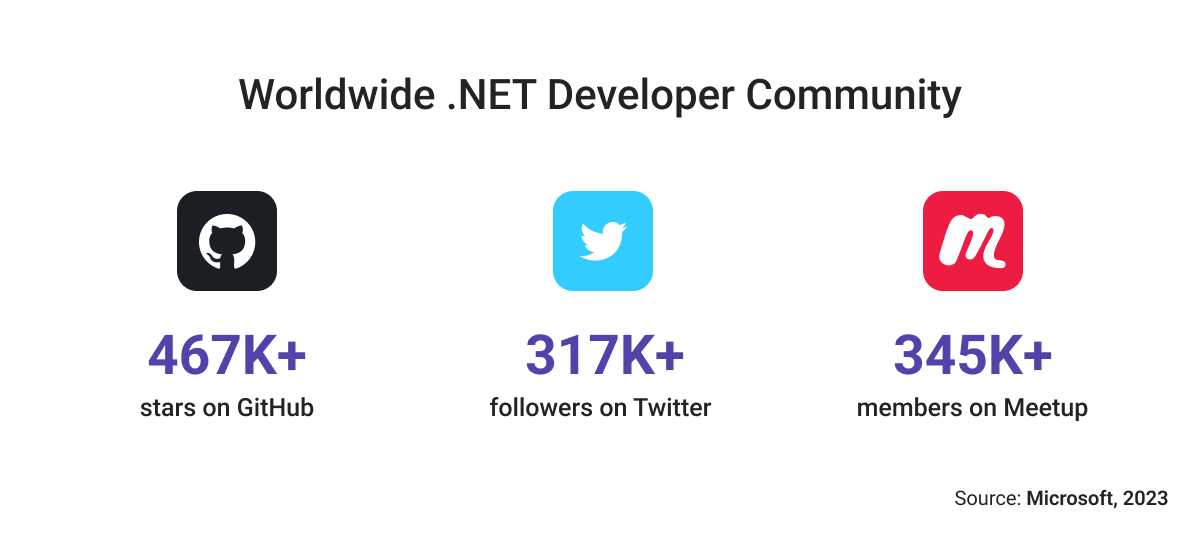
Large Community
The .NET community is large and supportive. It has grown significantly since Microsoft made it open-source, which has given developers more freedom to use and modify it. Developers can easily access support and guidance from other developers in the community, making it easier to solve problems and learn new skills.
.NET Core is open-source, and all of its materials are available on GitHub. With many contributors adding new things every day, ASP.NET is currently the fifth most popular framework for web development worldwide. With a big group of developers helping others, for almost any problem a beginner or skilled .NET developer faces - the solution is out there.
-Fernando Ayrosa Vezzali, Senior .Net Developer
.NET Core Supports a Wide Range of Applications
The versatility of the .NET framework enables developers to create a wide range of applications across various domains, such as gaming, mobile, IoT, and AI. In fact, Microsoft has recently partnered with SWIFT to bring AI and data to the forefront of Fintech, creating an ecosystem that offers secure and efficient operations for banks and corporations.
With the increasing importance of Machine Learning, Big Data, and AI, businesses have started investing heavily in integrating these components into their applications. Industries such as healthcare, education, marketing, and banking can greatly benefit from these technologies, making daily life more streamlined and efficient.
.NET Core Enables Top App Performance
With every new release of the .NET Core framework, Microsoft has been gradually increasing the performance of the application by a few percentage points.
Stack Overflow, the renowned knowledge-sharing platform for software developers, has been built on the .NET Core framework. Despite serving 5.3 million page views per day, the platform manages to operate with just nine servers, thanks to the efficiency of the framework.
As time goes by, the Node.js framework tends to become bulky and slower, requiring additional investment for scaling up. In a bid to avoid this, a company decided to migrate its API to the .NET Core. The outcome was a remarkable 2000% increase in throughput, all while using the same-size servers as before.
In combination with the appropriate database and architecture, the .NET Core framework is the ideal choice for any business that requires scaling up in the future.
Automatic Monitoring in ASP.NET
Finally, the automatic monitoring feature of ASP.NET is a significant advantage for developers. It ensures that they are promptly notified of any issues that occur during the coding process, such as infinite loops or memory leaks. This allows developers to quickly identify and fix problems, reducing the risk of bugs and errors in the final application.
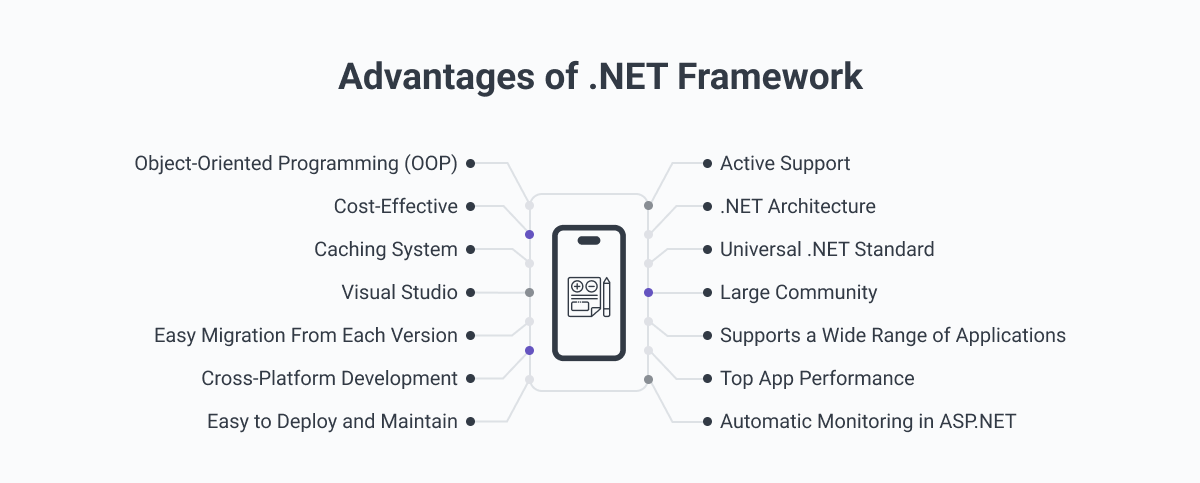
The Disadvantages of .NET Framework
.NET is still seen as one of the most popular and advanced programming platforms. However, it’s not perfect and comes with specific problems. at Softjourn said:
-Gabriel Bombardi, Software Engineer
Object-Relational Support Issues
One of the cornerstones of .NET's object-relational programming (OOP) is the Entity Framework. However, some concerns have been raised about the flexibility of this framework in accommodating new database designs, as it may not support emerging ones. This can pose challenges for developers who need to work with cutting-edge technologies.
Vendor Lock-in
Another issue that some developers may face is vendor lock-in. Since the .NET bundle is owned by Microsoft, any changes or limitations that the company imposes can have a significant impact on projects developed under the framework. This lack of control can be frustrating for developers who want to have more autonomy over their projects.
Licensing Cost
Licensing costs are another factor to consider when working with .NET. While many tools and features are available for free, others may require expensive licensing fees. For instance, Visual Studio, a popular integrated development environment (IDE), can cost over $500 for a one-year subscription. The cost can add up quickly, particularly for larger or more complex projects.
Stability Issues for New Releases
Stability is also a concern with new releases of .NET. Whenever Microsoft introduces new features or updates, documentation and support may be lacking. This can lead to issues with project stability and create frustration for developers who are trying to stay up-to-date with the latest features and technologies.
Memory Management
Like any other technology, memory leaks are a common issue with .NET as well. Although .NET has a garbage collector that helps deal with this problem, developers still need to pay attention to resource management to ensure efficient memory usage.
-Fernando Ayrosa Vezzali, Senior .Net Developer
Difficulty in the Transition to .NET Core
The migration from older versions of .NET to .NET Core can be a challenging process. This is because a majority of applications are still built using older .NET versions, and upgrading to the latest version can result in compatibility issues. However, with careful planning and execution, this transition can be accomplished smoothly.
Steep Learning Curve
.NET has a huge base of preprogrammed libraries that are changing and updating, and it comes with a steep learning curve, especially for newcomers. Of course, with a big community online, it does get easier to find information, but it can be overwhelming at some point.
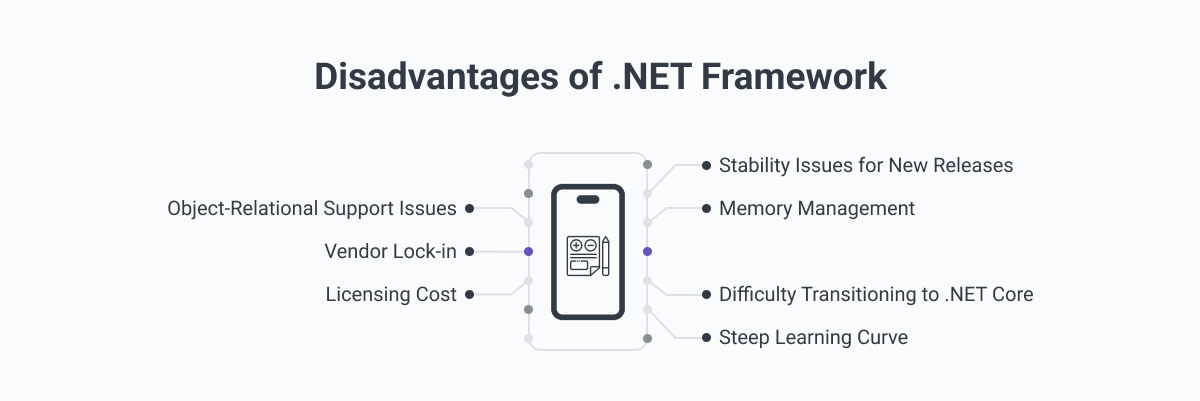
Is .NET Framework Right for Your Project?
As a very powerful tool, .NET is used to build a wide variety of applications. The following are some of the most commonly developed applications using .NET:
- Desktop applications. .NET provides major tech solutions to build desktop applications.
- Web applications. ASP.NET is a set of libraries and tools for building web applications, including front-end websites, APIs, and microservices.
- Mobile applications. Using Xamaring, it's easy to develop native apps for Android, iOS, and Windows.
- Gaming applications. .NET development platform provides all necessary tools for game development frameworks such as Unity.
- Scalable apps. For businesses that are rapidly growing and need to scale, .NET gives a chance to quickly redesign their apps and respond to the changing needs of their users.
- Cross-platform applications. The popularity of cross-platform apps is on the rise, and if you want to reduce development efforts, .NET is a good choice.
- Enterprise-level applications. Microsoft provides a useful toolset for developing enterprise-level applications. .NET is still not the first choice when it comes to building large applications, but it is definitely getting better at it.
.NET Development for Finance Projects
The .NET framework excels in finance projects due to its scalability, robust architecture, built-in libraries, and support for multiple languages. It offers strong security features and easy data integration, making it ideal for building secure and efficient financial applications.
- Gabriel Bombardi, Software Engineer
.NET Development for Ticketing Projects
The .NET framework offers ticketing projects several advantages. It provides a robust development environment, scalability, and cross-platform capabilities, enabling the creation of efficient and secure ticketing systems that can adapt to changing demands.
-Gabriel Bombardi, Software Engineer
.NET Framework vs .NET Core
Short answer: Cross-platform compatibility - .NET Core runs on Linux and macOS, while .NET Framework operates only on Windows. At its core, .NET Core is almost a complete reboot of the .NET Framework stack. A number of technologies were excluded from the new platform for various reasons. It's essential to understand that .NET Core is primarily designed for server-side and cloud solutions development. For desktop applications, the classic .NET for Windows (with WPF and Windows Forms support) and Mono for Linux and Mac OS X (with Windows Forms support) are more suitable. Mobile projects can be developed using Xamarin.
Here's a concise breakdown of the differences:
-
Purpose and Usage:
- .NET Framework: A mature platform used for building Windows desktop applications and web applications. It has been around since 2002 and has been used for a variety of Windows-centric applications.
- .NET Core: A newer, cross-platform framework designed for building modern, cloud-based, and internet-connected applications. It can be used for applications that run on Windows, macOS, and Linux.
-
Cross-Platform Capability:
- .NET Framework: Primarily for Windows applications.
- .NET Core: Cross-platform, supporting Windows, macOS, and Linux.
-
Modularity and Deployment:
- .NET Framework: Typically relies on system-wide versioning. Multiple versions can be present, but they affect the whole system.
- .NET Core: Offers side-by-side versioning and is modular, which means you can package the .NET Core runtime with your application. This approach enables different applications to use different .NET Core versions on the same system.
-
Performance:
- .NET Framework: Stable performance, but optimizations can sometimes be limited because of backward compatibility requirements.
- .NET Core: Generally provides better performance due to its modular architecture and optimizations. It's designed to be lean, and you include only the libraries and dependencies you need.
-
Library Support:
- .NET Framework: Has extensive libraries and APIs accumulated over the years, making it a robust platform.
- .NET Core: Has a more streamlined set of libraries, focusing on modularity. While it's catching up in terms of library support, some older .NET Framework libraries might not be available or compatible.
-
Support and Development:
- .NET Framework: While it continues to be supported by Microsoft, its development is more or less in a maintenance mode. No major new features are expected.
- .NET Core: It's the future of .NET, with active development, new features, and enhancements. Microsoft's focus is clear with the evolution into .NET 5 and subsequent versions, which aim to unify the .NET platform.
-
Web Application Development:
- .NET Framework: Uses ASP.NET MVC for web application development.
- .NET Core: Uses ASP.NET Core, which is a redesigned version of ASP.NET, optimized for performance and flexibility.
Choosing between .NET Core and .NET Framework largely depends on the specific needs of your project, the platforms you target, and your future-proofing requirements. With Microsoft's focus shifting to .NET Core (and its evolution into just ".NET" starting with .NET 5), it's evident where the future lies for new projects. However, .NET Framework remains a solid choice for existing projects and specific Windows-centric applications.
Ready to Develop Using .NET?
For complex and lengthy projects partnering with a .net development company can support your in-house team to focus on what matters most. In Softjourn, we have a pool of .net developers ready to take up a new .NET project and provide our clients with high-quality code.
With many companies offering .NET development services, you will need to sift through the right software development company or partner that fits your requirements. We advise creating a shortlist of the companies with the expertise you're seeking and setting up meetings to see if they can adequately serve your software development needs.
Outsourcing .NET development can also offer the advantage of leveraging global talent and technology expertise. By collaborating with a dedicated development team, you gain access to specialized skills and knowledge that may not be readily available in-house. This can lead to more innovative solutions and a higher quality of software. Ensure that the company you choose has a proven track record of successful .NET projects, and don't hesitate to ask for case studies or references. Communication and cultural compatibility are key factors to consider as well, as they greatly affect the efficiency and smoothness of the development process.
It's recommended to look for companies that have worked on projects that are similar to yours and understand your industry. Additionally, it's important to find out whether they have the capacity to provide .net development services within your timeline and budget.

The Future of .NET: Are You Ready for it?
Choosing the right framework for your project is crucial. .NET is a popular and versatile technology that has been used by many companies across different industries. It has a number of advantages, including a wide range of features, an active community, and support from Microsoft.
.NET also has the ability to support a wide range of applications, from gaming and mobile to IoT and AI. Additionally, with each new version, Microsoft has made significant improvements to the performance of the framework.
However, there are also some disadvantages to consider, such as the potential for memory leaks and the licensing costs associated with certain tools and IDEs. Additionally, transitioning older applications to the latest versions of .NET can be a bumpy process.
To maintain stability and keep up with emerging technologies, Microsoft recommends moving to the latest version of .NET, which is currently .NET 6. And with .NET 7 in development, the platform will continue to evolve and improve.
If you're considering using .NET for your next project, it's important to have a skilled team on your side. Softjourn is here to help and can provide the expertise and support you need to make your project a success.
We are specially equipped to provide .NET development and custom software development services to companies in the fintech, payments, prepaid, ticketing, and M&E industries. Contact us today to learn about how we can help your business succeed.
| Feature | C# | JavaScript | |||
|---|---|---|---|---|---|
| Type System | Static | Dynamic | Static | Dynamic | Dynamic |
| Object-Oriented | Yes | Yes | Yes | Yes | Yes |
| Functional Programming | Yes | Yes | Yes | Yes | Partial |
| Platform Independence | Yes | No | Windows Only | Web | Web |
| Garbage Collection | Yes | Yes | Yes | Yes | Yes |
| Popular Frameworks | Spring, Hibernate | Django, Flask | |||
| Performance | High | Moderate | High | Moderate | Moderate |
| Community | Large | Large | Large | Large | Large |
| Syntax Simplicity | Moderate | High | High | High | High |
| Learning Curve | Moderate | Low | Low | Low | Low |
| Database Integration | JDBC | SQLAlchemy | ADO.NET | N/A | MySQLi, PDO |
| Web Development | Yes | Yes | Yes | Yes | Yes |
| Mobile Development | Android SDK | Kivy | Xamarin | N/A | |
| Scripting | No | Yes | No | Yes | Yes |
The Future of .NET
Today, a number of companies are using the .NET framework as their primary tech stack. To maintain its stability in 2024, Microsoft advises everyone to move to .NET 6, which is currently the latest version.
.NET 7 is in the works, and it will be the next step in the platform development. If you have an upcoming .NET project and are in need of a skilled team on your side - Softjourn can help.


















